广东省深圳市文汇中学九年级英语上册Unit1 Wise men in history 课件 (新版)牛津深圳版
文档属性
| 名称 | 广东省深圳市文汇中学九年级英语上册Unit1 Wise men in history 课件 (新版)牛津深圳版 | 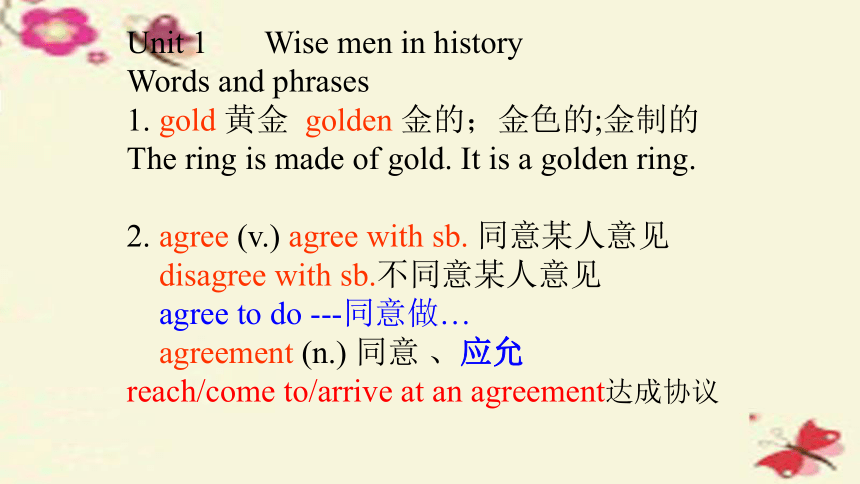 | |
| 格式 | zip | ||
| 文件大小 | 5.3MB | ||
| 资源类型 | 教案 | ||
| 版本资源 | 北师大版 | ||
| 科目 | 英语 | ||
| 更新时间 | 2017-07-22 00:00:00 | ||
图片预览

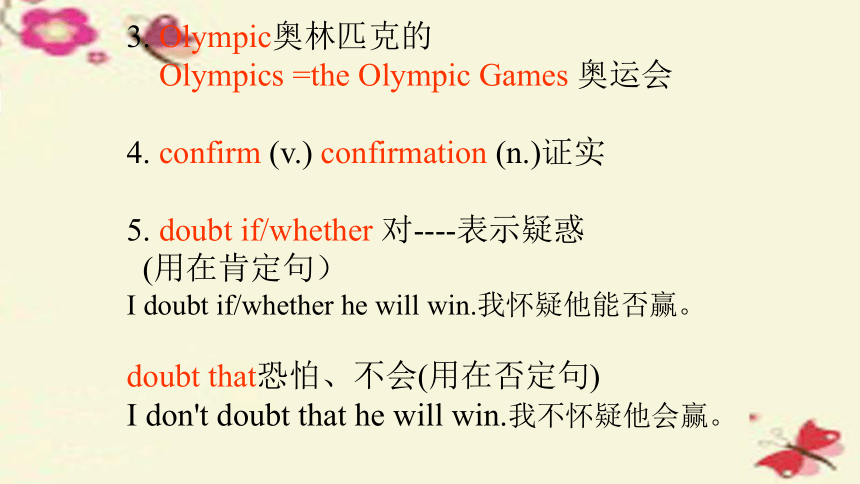
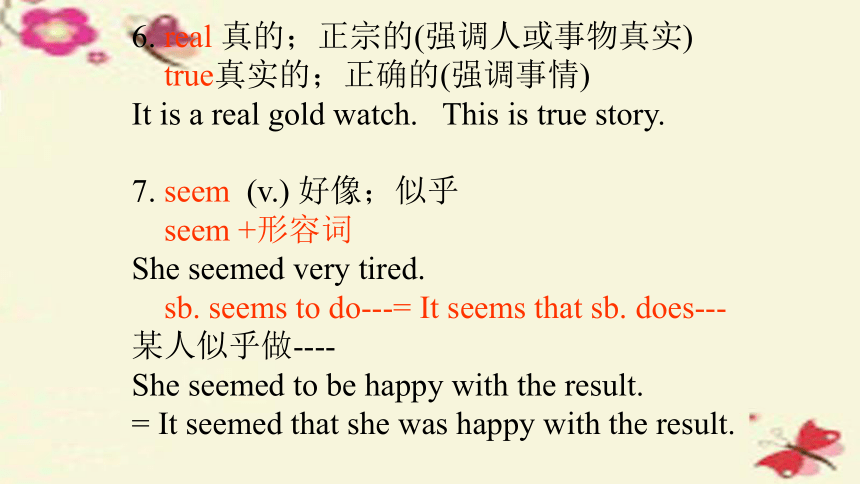
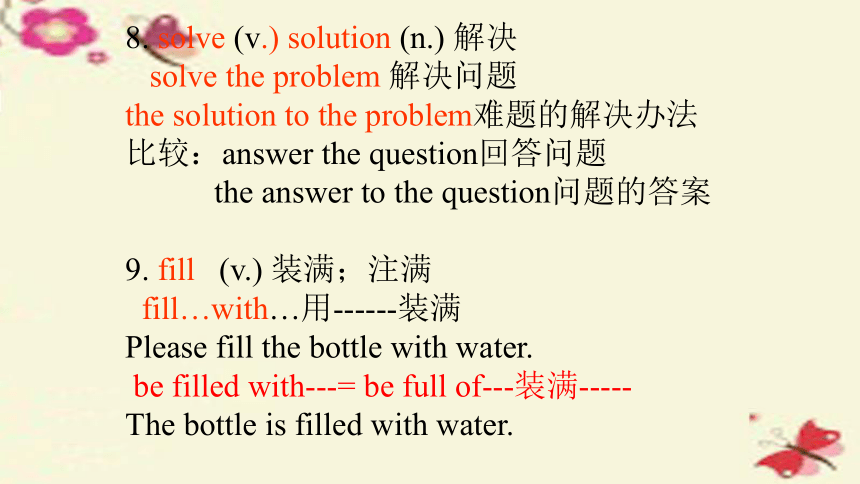
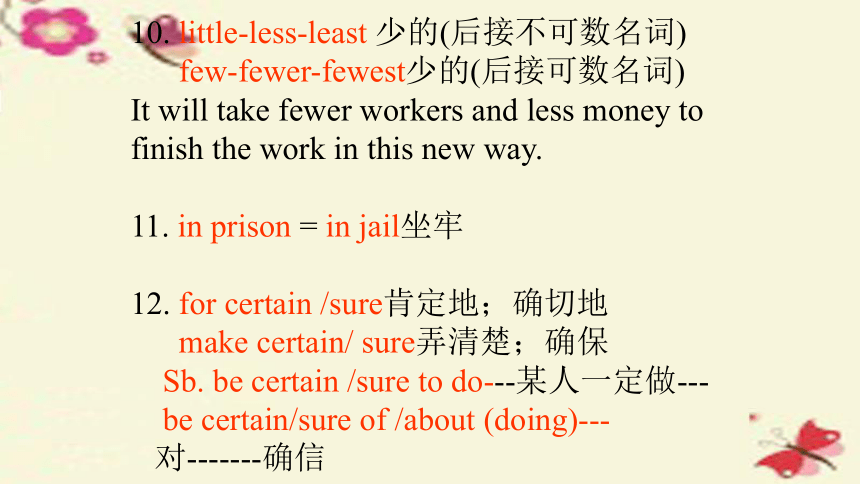

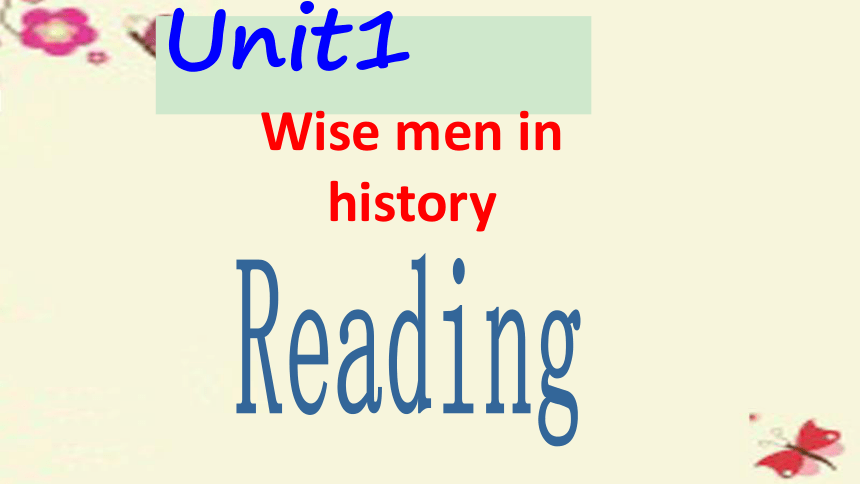
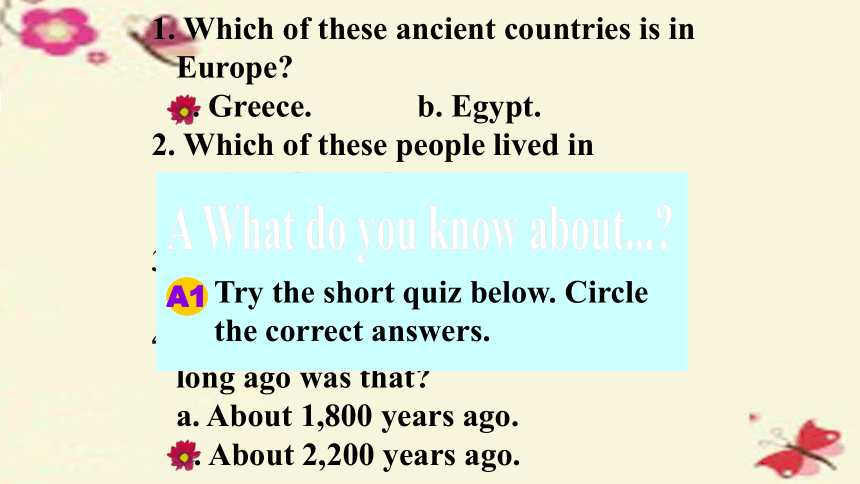
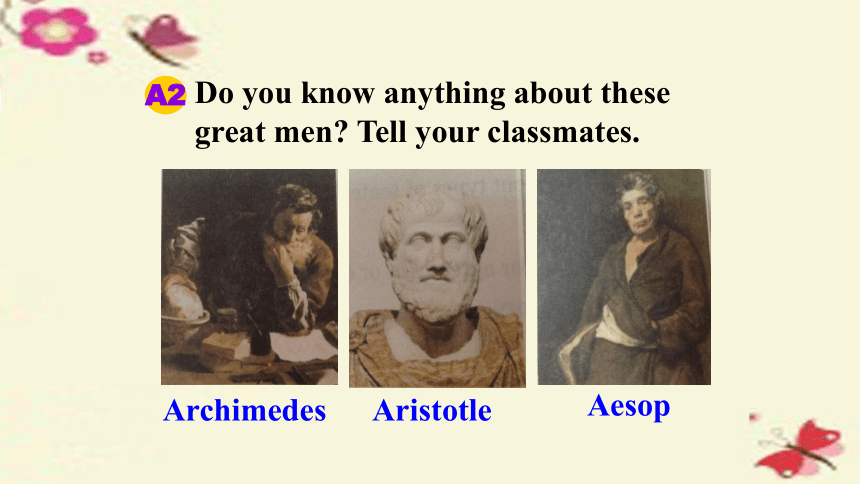
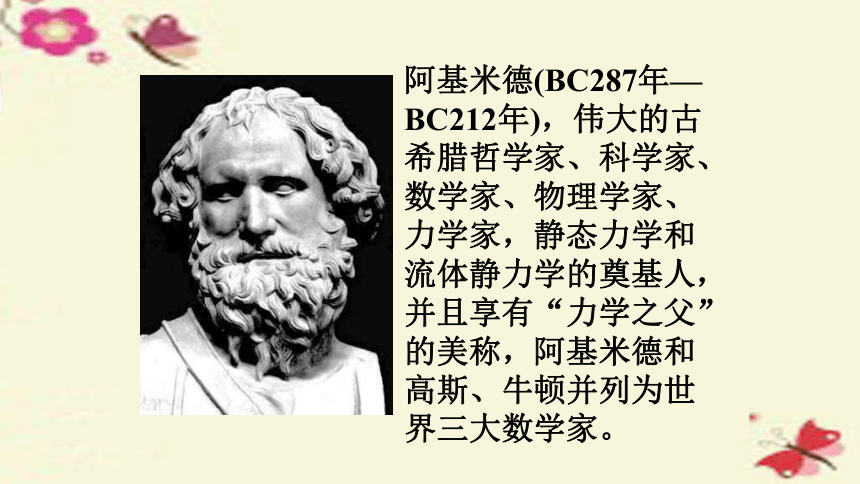
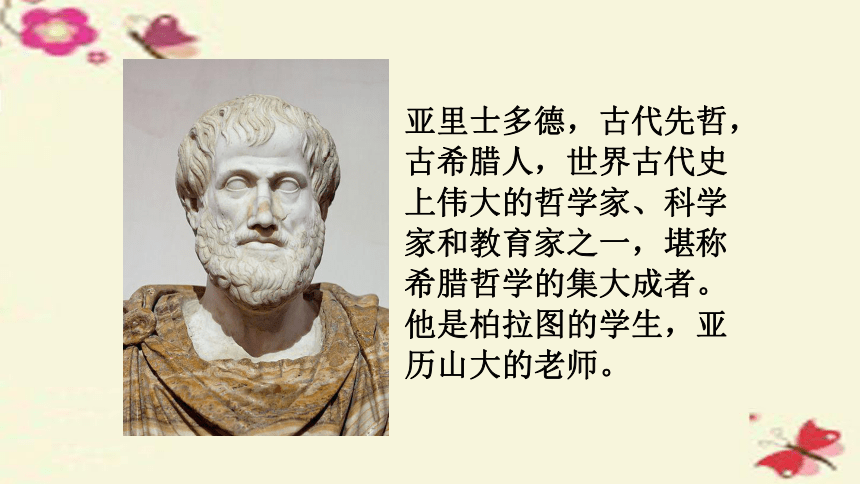
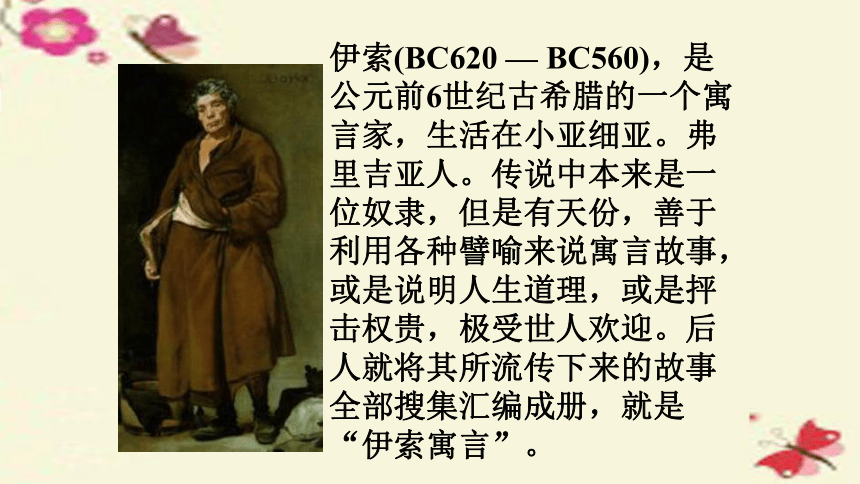
文档简介
课件86张PPT。Unit 1 Wise men in history
Words and phrases
gold 黄金 golden 金的;金色的;金制的
The ring is made of gold. It is a golden ring.
2. agree (v.) agree with sb. 同意某人意见
disagree with sb.不同意某人意见
agree to do ---同意做…
agreement (n.) 同意 、应允
reach/come to/arrive at an agreement达成协议
3. Olympic奥林匹克的
Olympics =the Olympic Games 奥运会
4. confirm (v.) confirmation (n.)证实
5. doubt if/whether 对----表示疑惑
(用在肯定句)
I doubt if/whether he will win.我怀疑他能否赢。
doubt that恐怕、不会(用在否定句)
I don't doubt that he will win.我不怀疑他会赢。 6. real 真的;正宗的(强调人或事物真实)
true真实的;正确的(强调事情)
It is a real gold watch. This is true story.
7. seem (v.) 好像;似乎
seem +形容词
She seemed very tired.
sb. seems to do---= It seems that sb. does---
某人似乎做----
She seemed to be happy with the result.
= It seemed that she was happy with the result.8. solve (v.) solution (n.) 解决
solve the problem 解决问题
the solution to the problem难题的解决办法
比较:answer the question回答问题
the answer to the question问题的答案
9. fill (v.) 装满;注满
fill…with…用------装满
Please fill the bottle with water.
be filled with---= be full of---装满-----
The bottle is filled with water. 10. little-less-least 少的(后接不可数名词)
few-fewer-fewest少的(后接可数名词)
It will take fewer workers and less money to finish the work in this new way.
11. in prison = in jail坐牢
12. for certain /sure肯定地;确切地
make certain/ sure弄清楚;确保
Sb. be certain /sure to do---某人一定做---
be certain/sure of /about (doing)---
对-------确信14. brave 勇敢的 braveness 勇敢
make a mistake犯错
correct 正确的 incorrect 不正确的
real 真的 false 假的
right 正确的 wrong 错误的Unit1ReadingWise men in history1. Which of these ancient countries is in Europe?
a. Greece. b. Egypt.
2. Which of these people lived in ancient Greece?
a. Archimedes. b. Julius Caesar.
3. What was Archimedes?
a. A scientist. b. A painter.
4. Archimedes died in 212 BC. How long ago was that?
a. About 1,800 years ago.
b. About 2,200 years ago.Try the short quiz below. Circle the correct answers.A What do you know about...?A1Do you know anything about these
great men? Tell your classmates.A2ArchimedesAristotle Aesop 阿基米德(BC287年—BC212年),伟大的古希腊哲学家、科学家、数学家、物理学家、力学家,静态力学和流体静力学的奠基人,并且享有“力学之父”的美称,阿基米德和高斯、牛顿并列为世界三大数学家。亚里士多德,古代先哲,古希腊人,世界古代史上伟大的哲学家、科学家和教育家之一,堪称希腊哲学的集大成者。他是柏拉图的学生,亚历山大的老师。伊索(BC620 — BC560),是公元前6世纪古希腊的一个寓言家,生活在小亚细亚。弗里吉亚人。传说中本来是一位奴隶,但是有天份,善于利用各种譬喻来说寓言故事,或是说明人生道理,或是抨击权贵,极受世人欢迎。后人就将其所流传下来的故事全部搜集汇编成册,就是“伊索寓言”。1. Who was the crown probably made for?
2. What is Archimedes doing in the first picture?
3. Why is Archimedes so excited?
4. What is in the right pot in the second picture?He is taking a bath.The King.He thought out a best way to solve the problem.The golden crown. Look at the pictures and the title of the story on page 3. Then answer the questions below. (P 2)BPre-readingReading Archimedes and the golden crown
Passage 1-2
in ancient Greece 在古代希腊
at first首先
isn’t it?不是吗?
is made of 由------制成
find out the truth查明真相
Passage 3-5
seems difficult to solve 似乎难于解决
still thinking about 正在思考
as 当----时候
got into进入
ran over溢出
That’s it. 就是这样了。
know how to solve 知道如何解决
Passage 6-7
1. went straight to 直接走向----
2. some gold of the same weight
同等重量的一些黄金
3. put----into----把------放入
4. the other pot另外一个罐
5. even more water更多水
Passage 8-9
displaced less water than溢出的水少于
tricked me欺骗我
What a bad man he is!
他是一个多么坏的人啊!
4. sent---to prison把----关进监狱
Reading
be happy with---=be pleased/satisfied with--
对...满意的
2. make sb. sth.=make sth. for sb.
某人制作某物
He is making his son a paper plane.
3. look for 寻找 find找到 find out查明
He looked for his lost bike everywhere, but he didn’t find it. But he wanted to look out who stole it. 4. be made of 用…制造(看得出材料)
be made from 用…制造(看 不出材料)
be made into 被制作成…
be made up of 由…组成
be made in 在某地制造
Desks are made of wood.
=Wood is made into desks
Wine is made from grapes.
=Grapes are made into wine.
Our class is made up of 50 students.
This car is made in China. 5. think about (doing)---=consider (doing)---
考虑做------
The man is thinking about what he will do next.
6. ask sb for sth 向某人要某物
He asked me politely for the book.
7. weigh (v.)称weight (n.)重量heavy (adj.)重的
How much do you weigh?=What is your weight?
=How heavy are you?你有多重?
8. one----the other---一个---另一个(两者中)
one----another---一个---另一个(三者以上)
9. even 更(后接比较级)
The question is even more difficult than that one.
10. a small amount of 少量的(后接不可数名词)
a small number of 少量的(后接可数名词复数)
11. cut ---in half 把----切成一半
divide----between 在----之间分配
12. go ahead 尽管去做吧
----May?I?ask?you?a?question?
---Yes,go?ahead.
13. be amazed at=be surprised at
对---感到惊讶
He was amazed at the news. 1. Later, however, he began to doubt that …
a. feel sure b. not feel sure
2. This problem seems difficult to solve.
a. write down b. find the correct answer
3. … as he filled his bath with water.
a. made … full b. emptied
4. Next, he put two pots into two big bowls …
a. deep round dishes b. flat dishes
5. A crown made completely of gold displaces less water …
a. a little b. a smaller amount of Here are some sentences from the story on page 3. Do you know the meanings of the words in italics? Circle the correct answers. (P 4)C1VocabularyOne day, two women came to King Solomon with a baby boy. Both women said the boy was their son. No one knew which woman was telling the _____.
King Solomon ordered a soldier to cut the boy in half, and divide the boy between the two women.Complete the story below with the words from the box. Change their forms if necessary. (P 4)certain fill real seem solve truthtruthC2The first woman said, “Go ahead. That ______ fair.” However, the second woman was ____ with fear. “No!” she shouted. “Don’t kill him! Let the other woman have him.”
King Solomon stopped the soldier. “Give the boy to the second woman,” he said. “I’m ______ that she’s his ____ mother.”
The woman took the baby boy home happily. Everyone was amazed at how King Solomon ______ this problem.seemsfilledcertain realsolved2345678Comprehension Put the pictures in the correct order by writing the numbers 1-8 in the boxes according to the story on page 3. (P 5) D1Why did King Hiero send the crown to Archimedes?
What happened when Archimedes got into the bath?
What did the crown maker do to the crown? Because King Hiero began to doubt whether the crown was a real golden crown. He asked Archimedes to find out the truth. Some water ran over and Archimedes got an idea about how to solve the king’s problem. He used the gold and another metal to make the crown. Read the story again and answer the questions below in complete sentences. (P 5)D2Discussion How did Archimedes find out that the crown was not made completely of gold? Discuss this with your classmates. (P 5)D3Questions tag (反意疑问句)反意疑问句是在陈述句之后附加一个简
略问句,对所陈述的内容提出反问。附加
疑问句的主语与陈述句中的主语的动词要
相对应。 在be动词,助动词,情态动词上
要保持一致。
II.结构:
1.肯定陈述句, 简略否定问句?
2. 否定陈述句, 简略肯定问句?
You are from China, aren’t you ?
He doesn’t study Japanese, does he ?III. 用法:
1.陈述部分的主语是表示物的 something, anything, everything, nothing 做主语,附加疑问句的主语用 it。
Something is wrong with it,_____ ___?
陈述部分的主语是表示人的someone, anyone no one, everyone,做主语,附加问句的主语用they.
Everybody is here today, ?isn’t itaren’t they 2.陈述句有表否定的词,后面用肯定.常见的词有:no, not, nothing, none, nobody, few, little, never, neither, hardly, nowhere, seldom
Few people can swim, ________?can they 但含有否定un-,in-,im-,il-,ir-,dis-,-less前缀后缀的派生词,后面还是照常加否定形式.
She dislikes it, __________?
You are hopeless, ___________? doesn’t she aren’t you3. 祈使句用于反意疑问句中
a. 肯定的祈使句, 用will you(表示请求) /
won’t you(表示提醒)。
Listen to me, will you (won’t you)?
b. 否定的祈使句, 用will you。
Don’t play with fire, will you?
c. Let’s 和 Let us的祈使句:Let’s go to school, shall we?
Let us help you, will you?Let’s …, shall we?
Let us …, will you? 4. 附加疑问句的主语通常要用人称代词的主格。
The boy is your brother, isn’t ?
The girls sing well,don’t ?
当陈述部分是there be/live/stand等, 附加问句用there作主语。
There is a book on the desk,__________?
There won’t be a meeting this evening, _________?hetheyisn’t therewill there5. 当陈述部分为I am,后面用aren’t I;
如果是I am not,后面用am I.
I am sad, I?
I am not sad, I? aren’t am 6.感叹句,isn’t it/aren’t +they?
What a nice day, isn’t it?
How tall they are, aren’t they?doesn’t he are you7.含有宾语从句的主从复合句,反意疑问部分与主句一致。但是,主语为第一人称I, we, 后面的动词为 think, believe, expect, feel, suppose, imagine时,问句部分跟从句保持一致。
He thinks you are wrong, _________? I don’t think you are right,__________?
I believe he will come here, _________________won’t he 8.must表示推测(一定)时, 反意疑问句 取决于must后面的动词.
He must be happy, ?
They must be playing football, ?
He must have done his homework, _______?must 作“必须”解时,反意疑问句用mustn’t 或needn’t.aren’t theyisn’t heHe must keep his word, mustn’t he?
They must clean the floor after school, needn’t they?hasn’t he9. 反意疑问句的回答与一般疑问句一样,用”yes”或”no” 回答。
You are a worker, aren’t you?
Yes, I am. (是的,我是)
No, I am not.(不,我不是)
注意:当反意疑问句的结构是前面否定,后面肯定的回答。
Yes(不),肯定结构. No(是的),否定结构.
You are not a worker, are you?
Yes, I am. (不,我是)
No, I am not.(是的,我不是) 中考题
( ) 1. ---Beijing isn’t the capital of China, is it?
---______.
Yes, it isn’t. B. Yes, it is.
C. No, it isn’t. D. No, it is.
( ) 2. ---Shenzhen isn’t the capital of China, is it?
---______.
A. Yes, it isn’t. B. Yes, it is.
C. No, it isn’t. D. No, it is.
BCKing Hiero showed the crown to the queen later. Complete their conversation with question tags.
Queen: You aren’t happy, _________?
What happened.
King: It’s my new crown. Take a look at it,
_________?
Queen: It looks beautiful, _________?
What’s wrong with it?are youwill youdoesn’t itKing: It isn’t made completely of gold.
That’s why I’m angry.
Queen: The crown maker tricked you,
__________? How did you find out?
King: Archimedes told me. Let’s have
dinner with him tonight, __________?
Queen: OK.didn’t heshall we1)His wife is a teacher,__________?
2)Bob wasn’t a driver,_________?
3)There were lots of questions,__________?
4)Tom has made a model plane,__________?
5)He usually drives carefully,___________?
6)He won’t be late,__________?
7)They can’t leave now,__________?
8)No one received a present, ____________?
9. That’s my book, ___________?
10) She’s never been there before, ________?Practice and find out the ruleisn’t shewas heweren’t therehasn’t hedoesn’t hewill hecan theydid theyisn’t ithas she陈述句是陈述一个事实或者说话人的看法的,陈述句分为肯定句和否定句。
陈述句句末用句号(。),朗读时用降调。定义:结构:陈述句的肯定式
1.主语+系动词+表语
Tina is my friend.
2. 主语+不及物动词
The river is flooded.
3.主语+及物动词+宾语
He bought an umbrella.
4.主语+及物动词+间接宾语+直接宾语
He passed me a cup of tea.
5.主语+及物动词+宾语+宾语补足语
She told me to buy a ticket.II. 陈述句的否定式
主语+be+not+表语
He is not a teacher.
主语+助动词/情态动词+not+谓语动词
+其他
I don't think you are right.
He hasn't yet paid the money.
他尚未付钱。使用“not”以外的否定词:
副词:never, seldom, hardly, little,
neither等。
She seldom comes to see me.
她不常来看我。
b. 形容词:no, few, little等。
He has few friends in Hong Kong.
他在香港几乎没有朋友。
c.代词:nothing, nobody, none等。
I found nobody in that house.
在那栋房子里我没看到任何人。疑问句的主要交际功能是提出问题,询问情况。分为一般疑问句、特殊疑问句、选择疑问句和反意疑问句。
疑问句句末用问号(?)。定义: 一般疑问句通常用来询问一件事情是否属实。答句通常是"yes或no"。
句型一:Be +主语+ …?
Are these books on the desk?
这些书在桌子上吗?
句型二:Do/Does/Did+主语+谓语+…?
Do you like English?
你喜欢英语吗?
句型三:情态动词+主语+谓语+…?
Must I finish my homework now?
我必须现在完成我的家庭作业吗?一般疑问句句型四:Have/Has+主语+过去分词+…?
Have you heard from him?
你收到他的来信吗?
另外,还有以be动词、助动词或情态动词的否定缩写形式开头的一般疑问句,这种句子一般表示请求、惊讶和对事物的看法等,回答时所用的yes和no表达的意思和汉语的习惯不同。例如:
-- Isn't he tall?
难道他不高吗?
-- Yes, he is.
不,他很高。 对句中某一成分提问的句子叫特殊疑问句。特殊疑问句以疑问词开头。
常用的疑问词有:what、who、whose、which、when、where、how、why等。不能用yes或no回答。朗读时用降调。
例如:
Who is singing in the room?
What class are you in?特殊疑问句句式: 特殊疑问词 + 一般疑问句
疑问词分为三类
疑问代词: what, who, which, whose, who
疑问词组: what(which, whose)+名词
疑问副词: when, where, why, how We use ‘Wh-’ questions to ask for information about someone or something.Ⅰ. what
问姓名;
问物品;
问职业;
what about 用来征求意见或询问消息,相当于how about
what colour 问颜色;
what class 问哪个班级;
what size 问尺寸 Ⅱ. who---Person (对人提问)
-- Who will visit you tomorrow?
-- My father.Ⅲ. when---Time (对时间提问)
-- When will you finish your homework?
-- Tomorrow.Ⅴ. why---Reason (对原因提问)
-- Why are you late?
-- Because I missed the bus.Ⅳ. where---Place (询问地点、场所)
Where do you live?
Where are you going? - How do you go to school?(问方式) - I go to school by bus.
- How are you?(问健康) -I’m fine. Thank you!
How is the weather today?(问天气)
(2) How+形容词(副词)~? 询问年龄、身高、数量、次数、距离……
How much are they? (问价格) Ⅵ. how
(1) How…? 询问做某事的方法、手段及健康、天气…… Millie: What a nice cake! ______ birthday is it
today?
Amy: It’s my birthday, Millie.
Millie: Happy birthday, Amy! _____ do you
usually celebrate your birthday?
Amy: We go out for a birthday dinner.
Millie: _____ goes to your birthday dinner?
Amy: My grandparents, aunts, uncles and
cousins.
Millie: I see. ______ do you have the dinner?
Amy: At a restaurant near my home.
Millie: ______ do you get at birthday presents?
Amy: Books, clothes, shoes, toys and some other
nice things.WhoseHowWhoWhereWhatMillie is asking Amy about her birthday. Complete their conversation with the correct question words. 选择疑问句定义:
提出两种或两种以上的情况,要求对方选择一种情况回答的问句。两种情况之间用or连接。
回答:
回答不用yes/no,用一个完整的句子或其省略形式。语调前升后降。分类:
一般选择疑问句和特殊选择疑问句
一般选择疑问句:
一般疑问句+or+被选择部分?
-- Do you like apples or pears?
-- I like pears.
2. 特殊选择疑问句:特殊疑问句, +A or B?
-- Which would you like better, tea or
coffee?
-- I like coffee.反意疑问句定义:
反意疑问句又叫附加疑问句,是指当提问的人对前面所叙述的事实不敢肯定,而需要向对方加以证实时所提出的问句。
结构:
陈述句,+简单问句。注意:
完成后一部分简单问句时,要根据前面陈述句的动词时态和人称来选择适当的助动词进行提问,前后两部分的人称和动词时态要保持一致。 前肯定后否定,前否定后肯定。
They work hard, don’t they?
She was ill yesterday, wasn’t she?
They haven’t been in Beijing for three years, have they? 祈使句的结构及用法
祈使句表示命令、请求、建议、或劝告等等。主语通常被省略,谓语动词用原形,句末用感叹号或句号,读降调。1.肯定的祈使句
1) 句型:以动词原形开头(省略主语)
Come in!
2) 动词前加do, 加强语气。表“务必,一定”
Do come on time! 一定要准时来!
Do look out! 一定要小心!
2. 否定祈使句
1) Don't +动词原形
Don't be late!
2) Let's + not + 动词原形
Let's not speak loudly! 1.由what引导的感叹句
What + a/an +形容词 + 可数名词的单数
//主语 + 谓语!
What a beautiful girl she is!
2) What + 形容词 + 可数名词复数 //主语
+谓语!
What important jobs they have done!
3) What+形容词+不可数名词//主语+谓语!
What sweet water it is! 2.由how引导的感叹词
1) How+形容词或副词//主语+谓语!
How interesting the dog is!
2) How+形容词+a/an+可数名词的单数形式
+主语+谓语!
How useful a subject it is!
3) How+主语+谓语!
How time flies!3.一些特殊形式
陈述句、疑问句或祈使句+感叹号,
表示某种强烈的感情
He runs so fast!
2) 一个词或词组
Wonderful! Look out! Great!
3) 以there here 等副词开头
There she is!
There goes the bell!4. 如何判断用what还是用how来引导感叹句
方法一:凡是用aan开头的,多用what
方法二:凡是形容词+名词,多用what
方法三:其他一般用howI. 单选。
Few of them hurt themselves in the
accident last night, ______
A. don’t they B. didn’t they
C. did they D. do they
2. ---You’ve never seen dinosaur eggs,
have you ?
---_____. How I wish to visit the
Dinosaur World.
A. Yes, I have B. No, I haven’t
C. Certainly, I have
D. Of course, I haven’t3. His sister had a bad cough, ___ she?
A. wasn’t B. doesn’t
C. hadn’t D. didn’t
4. Don’t smoke in the meeting-room,
______?
A. do you B. will you
C. can you D. could you
5. John can hardly understand any
Chinese, ____ he?
A. Can’t B. doesn’t C. can D. does6. _______ call me Wang Wang! It’s my
dog’s name.(2013南充)
A. Not B. No C. Don’t
7. ______ hard and you’ll succeed sooner
or later.(2013黔东南)
A. Study B. To study
C. Studying D. Studied
8. _____ a beautiful car! I’ve never seen it
before.(2013 江苏,苏州)
A. What B. Which C. How D. Whether9. -- Tony, ____ are you in such a hurry?
-- The meeting will start soon. I don’t
want to be late.(2013 安徽)
A. where B. how
C. when D. why
10. -- ______ do you play football?
-- Once a week.(2011 北京,24)
A. How much B. How long
C. How often D. How farUnit1Wise men in historyThe ancient OlympicsListen to a radio programme about sports in the ancient Olympics. Match the descriptions with the pictures by writing the numbers 1-4 in the boxes.Listen to the recording again and then complete the notes below. Write one word in each blank.Number 1
It is done on one’s _______. You must run as ______ as you can.
Number 2
The men try to _______ each other to be ground.Number 3
Both men and ______ take part in this sport. The men try to get these animals to run as ______ as they can.
Number 4
The men have to hit _______ _______.Asking for agreement or confirmationWe use a falling intonation when we are asking for agreement(寻求赞同时) .speakingWe use a rising intonation when we are asking for confirmation
(寻求证实时) .Read the conversation below and practise it in pairs. Pay attention to the intonation for the question tags.Speak up
Work in pairs. Read the following story and complete the notes below. Then retell the story to your classmate. Helen at the Olympics
In ancient Greece, women were not allowed to watch the Olympics. However, Helen, a brave woman, wanted to watch her son, Rodus, run.“I’m going to see you at the Olympics tomorrow,” said Helen.
“But Mum, the king will be angry,” said Rodus.
“Don’t worry. I’ll think of a way,” replied Helen.
The next day, Helen dressed as a soldier to attend the Olympics. She was soon caught.
“Take her to prison,” said the king.Who: When:
Where:
What:
Why:Helen in ancient timesIn ancient GreeceHelen watched her son run at the Olympics and was taken to prison.Because women were not allowed to watch the Olympics.Look for a story in a book or on the Internet. Write notes about the story. Then retell the story to your classmate in your own words. Think about the following ideas.-someone has done an exciting thing
-someone has seen or done something unusual
-an animal or a pet can do unusual thingsUnit1WritingWise men in history Improving your work
When you have written something, you should check your work to make sure the spelling, grammar and punctuation are all correct.Work in pairs. Find and underline the mistakes in the following story. Discuss the mistakes and, next to each line, write what kind of mistake it is. Use the abbreviations below.gr=grammar mistake
sp=spelling mistake
p=punctuation mistake Julius Caesar killed by freind
Julius Caesar was warn that someone wanted to kill him and he should not speak on public? He was standing on the steps of the Senate when he attacked. He said, “I must speak to my poeple.” As he died, he see his oldest friend Brutus. He was one of the killers, “You too, Brutus?” he asked, and die.spgrgr/pgrspgrfriendwarnedin.was attackedpeoplesawCorrect the mistakes in the story.pgr.saiddied.Other parts:
not----any longer不再=no longer
leave me alone别管我
in the future在将来
Greece 希腊 Greek希腊人
allow sb. to do--- =sb. be allowed to do---
允许某人做---
allow doing--- 允许做-----
6. think of a way 想出办法
7. add up 加起来
8. cut up 切碎
9. take a look at= look at看着
Words and phrases
gold 黄金 golden 金的;金色的;金制的
The ring is made of gold. It is a golden ring.
2. agree (v.) agree with sb. 同意某人意见
disagree with sb.不同意某人意见
agree to do ---同意做…
agreement (n.) 同意 、应允
reach/come to/arrive at an agreement达成协议
3. Olympic奥林匹克的
Olympics =the Olympic Games 奥运会
4. confirm (v.) confirmation (n.)证实
5. doubt if/whether 对----表示疑惑
(用在肯定句)
I doubt if/whether he will win.我怀疑他能否赢。
doubt that恐怕、不会(用在否定句)
I don't doubt that he will win.我不怀疑他会赢。 6. real 真的;正宗的(强调人或事物真实)
true真实的;正确的(强调事情)
It is a real gold watch. This is true story.
7. seem (v.) 好像;似乎
seem +形容词
She seemed very tired.
sb. seems to do---= It seems that sb. does---
某人似乎做----
She seemed to be happy with the result.
= It seemed that she was happy with the result.8. solve (v.) solution (n.) 解决
solve the problem 解决问题
the solution to the problem难题的解决办法
比较:answer the question回答问题
the answer to the question问题的答案
9. fill (v.) 装满;注满
fill…with…用------装满
Please fill the bottle with water.
be filled with---= be full of---装满-----
The bottle is filled with water. 10. little-less-least 少的(后接不可数名词)
few-fewer-fewest少的(后接可数名词)
It will take fewer workers and less money to finish the work in this new way.
11. in prison = in jail坐牢
12. for certain /sure肯定地;确切地
make certain/ sure弄清楚;确保
Sb. be certain /sure to do---某人一定做---
be certain/sure of /about (doing)---
对-------确信14. brave 勇敢的 braveness 勇敢
make a mistake犯错
correct 正确的 incorrect 不正确的
real 真的 false 假的
right 正确的 wrong 错误的Unit1ReadingWise men in history1. Which of these ancient countries is in Europe?
a. Greece. b. Egypt.
2. Which of these people lived in ancient Greece?
a. Archimedes. b. Julius Caesar.
3. What was Archimedes?
a. A scientist. b. A painter.
4. Archimedes died in 212 BC. How long ago was that?
a. About 1,800 years ago.
b. About 2,200 years ago.Try the short quiz below. Circle the correct answers.A What do you know about...?A1Do you know anything about these
great men? Tell your classmates.A2ArchimedesAristotle Aesop 阿基米德(BC287年—BC212年),伟大的古希腊哲学家、科学家、数学家、物理学家、力学家,静态力学和流体静力学的奠基人,并且享有“力学之父”的美称,阿基米德和高斯、牛顿并列为世界三大数学家。亚里士多德,古代先哲,古希腊人,世界古代史上伟大的哲学家、科学家和教育家之一,堪称希腊哲学的集大成者。他是柏拉图的学生,亚历山大的老师。伊索(BC620 — BC560),是公元前6世纪古希腊的一个寓言家,生活在小亚细亚。弗里吉亚人。传说中本来是一位奴隶,但是有天份,善于利用各种譬喻来说寓言故事,或是说明人生道理,或是抨击权贵,极受世人欢迎。后人就将其所流传下来的故事全部搜集汇编成册,就是“伊索寓言”。1. Who was the crown probably made for?
2. What is Archimedes doing in the first picture?
3. Why is Archimedes so excited?
4. What is in the right pot in the second picture?He is taking a bath.The King.He thought out a best way to solve the problem.The golden crown. Look at the pictures and the title of the story on page 3. Then answer the questions below. (P 2)BPre-readingReading Archimedes and the golden crown
Passage 1-2
in ancient Greece 在古代希腊
at first首先
isn’t it?不是吗?
is made of 由------制成
find out the truth查明真相
Passage 3-5
seems difficult to solve 似乎难于解决
still thinking about 正在思考
as 当----时候
got into进入
ran over溢出
That’s it. 就是这样了。
know how to solve 知道如何解决
Passage 6-7
1. went straight to 直接走向----
2. some gold of the same weight
同等重量的一些黄金
3. put----into----把------放入
4. the other pot另外一个罐
5. even more water更多水
Passage 8-9
displaced less water than溢出的水少于
tricked me欺骗我
What a bad man he is!
他是一个多么坏的人啊!
4. sent---to prison把----关进监狱
Reading
be happy with---=be pleased/satisfied with--
对...满意的
2. make sb. sth.=make sth. for sb.
某人制作某物
He is making his son a paper plane.
3. look for 寻找 find找到 find out查明
He looked for his lost bike everywhere, but he didn’t find it. But he wanted to look out who stole it. 4. be made of 用…制造(看得出材料)
be made from 用…制造(看 不出材料)
be made into 被制作成…
be made up of 由…组成
be made in 在某地制造
Desks are made of wood.
=Wood is made into desks
Wine is made from grapes.
=Grapes are made into wine.
Our class is made up of 50 students.
This car is made in China. 5. think about (doing)---=consider (doing)---
考虑做------
The man is thinking about what he will do next.
6. ask sb for sth 向某人要某物
He asked me politely for the book.
7. weigh (v.)称weight (n.)重量heavy (adj.)重的
How much do you weigh?=What is your weight?
=How heavy are you?你有多重?
8. one----the other---一个---另一个(两者中)
one----another---一个---另一个(三者以上)
9. even 更(后接比较级)
The question is even more difficult than that one.
10. a small amount of 少量的(后接不可数名词)
a small number of 少量的(后接可数名词复数)
11. cut ---in half 把----切成一半
divide----between 在----之间分配
12. go ahead 尽管去做吧
----May?I?ask?you?a?question?
---Yes,go?ahead.
13. be amazed at=be surprised at
对---感到惊讶
He was amazed at the news. 1. Later, however, he began to doubt that …
a. feel sure b. not feel sure
2. This problem seems difficult to solve.
a. write down b. find the correct answer
3. … as he filled his bath with water.
a. made … full b. emptied
4. Next, he put two pots into two big bowls …
a. deep round dishes b. flat dishes
5. A crown made completely of gold displaces less water …
a. a little b. a smaller amount of Here are some sentences from the story on page 3. Do you know the meanings of the words in italics? Circle the correct answers. (P 4)C1VocabularyOne day, two women came to King Solomon with a baby boy. Both women said the boy was their son. No one knew which woman was telling the _____.
King Solomon ordered a soldier to cut the boy in half, and divide the boy between the two women.Complete the story below with the words from the box. Change their forms if necessary. (P 4)certain fill real seem solve truthtruthC2The first woman said, “Go ahead. That ______ fair.” However, the second woman was ____ with fear. “No!” she shouted. “Don’t kill him! Let the other woman have him.”
King Solomon stopped the soldier. “Give the boy to the second woman,” he said. “I’m ______ that she’s his ____ mother.”
The woman took the baby boy home happily. Everyone was amazed at how King Solomon ______ this problem.seemsfilledcertain realsolved2345678Comprehension Put the pictures in the correct order by writing the numbers 1-8 in the boxes according to the story on page 3. (P 5) D1Why did King Hiero send the crown to Archimedes?
What happened when Archimedes got into the bath?
What did the crown maker do to the crown? Because King Hiero began to doubt whether the crown was a real golden crown. He asked Archimedes to find out the truth. Some water ran over and Archimedes got an idea about how to solve the king’s problem. He used the gold and another metal to make the crown. Read the story again and answer the questions below in complete sentences. (P 5)D2Discussion How did Archimedes find out that the crown was not made completely of gold? Discuss this with your classmates. (P 5)D3Questions tag (反意疑问句)反意疑问句是在陈述句之后附加一个简
略问句,对所陈述的内容提出反问。附加
疑问句的主语与陈述句中的主语的动词要
相对应。 在be动词,助动词,情态动词上
要保持一致。
II.结构:
1.肯定陈述句, 简略否定问句?
2. 否定陈述句, 简略肯定问句?
You are from China, aren’t you ?
He doesn’t study Japanese, does he ?III. 用法:
1.陈述部分的主语是表示物的 something, anything, everything, nothing 做主语,附加疑问句的主语用 it。
Something is wrong with it,_____ ___?
陈述部分的主语是表示人的someone, anyone no one, everyone,做主语,附加问句的主语用they.
Everybody is here today, ?isn’t itaren’t they 2.陈述句有表否定的词,后面用肯定.常见的词有:no, not, nothing, none, nobody, few, little, never, neither, hardly, nowhere, seldom
Few people can swim, ________?can they 但含有否定un-,in-,im-,il-,ir-,dis-,-less前缀后缀的派生词,后面还是照常加否定形式.
She dislikes it, __________?
You are hopeless, ___________? doesn’t she aren’t you3. 祈使句用于反意疑问句中
a. 肯定的祈使句, 用will you(表示请求) /
won’t you(表示提醒)。
Listen to me, will you (won’t you)?
b. 否定的祈使句, 用will you。
Don’t play with fire, will you?
c. Let’s 和 Let us的祈使句:Let’s go to school, shall we?
Let us help you, will you?Let’s …, shall we?
Let us …, will you? 4. 附加疑问句的主语通常要用人称代词的主格。
The boy is your brother, isn’t ?
The girls sing well,don’t ?
当陈述部分是there be/live/stand等, 附加问句用there作主语。
There is a book on the desk,__________?
There won’t be a meeting this evening, _________?hetheyisn’t therewill there5. 当陈述部分为I am,后面用aren’t I;
如果是I am not,后面用am I.
I am sad, I?
I am not sad, I? aren’t am 6.感叹句,isn’t it/aren’t +they?
What a nice day, isn’t it?
How tall they are, aren’t they?doesn’t he are you7.含有宾语从句的主从复合句,反意疑问部分与主句一致。但是,主语为第一人称I, we, 后面的动词为 think, believe, expect, feel, suppose, imagine时,问句部分跟从句保持一致。
He thinks you are wrong, _________? I don’t think you are right,__________?
I believe he will come here, _________________won’t he 8.must表示推测(一定)时, 反意疑问句 取决于must后面的动词.
He must be happy, ?
They must be playing football, ?
He must have done his homework, _______?must 作“必须”解时,反意疑问句用mustn’t 或needn’t.aren’t theyisn’t heHe must keep his word, mustn’t he?
They must clean the floor after school, needn’t they?hasn’t he9. 反意疑问句的回答与一般疑问句一样,用”yes”或”no” 回答。
You are a worker, aren’t you?
Yes, I am. (是的,我是)
No, I am not.(不,我不是)
注意:当反意疑问句的结构是前面否定,后面肯定的回答。
Yes(不),肯定结构. No(是的),否定结构.
You are not a worker, are you?
Yes, I am. (不,我是)
No, I am not.(是的,我不是) 中考题
( ) 1. ---Beijing isn’t the capital of China, is it?
---______.
Yes, it isn’t. B. Yes, it is.
C. No, it isn’t. D. No, it is.
( ) 2. ---Shenzhen isn’t the capital of China, is it?
---______.
A. Yes, it isn’t. B. Yes, it is.
C. No, it isn’t. D. No, it is.
BCKing Hiero showed the crown to the queen later. Complete their conversation with question tags.
Queen: You aren’t happy, _________?
What happened.
King: It’s my new crown. Take a look at it,
_________?
Queen: It looks beautiful, _________?
What’s wrong with it?are youwill youdoesn’t itKing: It isn’t made completely of gold.
That’s why I’m angry.
Queen: The crown maker tricked you,
__________? How did you find out?
King: Archimedes told me. Let’s have
dinner with him tonight, __________?
Queen: OK.didn’t heshall we1)His wife is a teacher,__________?
2)Bob wasn’t a driver,_________?
3)There were lots of questions,__________?
4)Tom has made a model plane,__________?
5)He usually drives carefully,___________?
6)He won’t be late,__________?
7)They can’t leave now,__________?
8)No one received a present, ____________?
9. That’s my book, ___________?
10) She’s never been there before, ________?Practice and find out the ruleisn’t shewas heweren’t therehasn’t hedoesn’t hewill hecan theydid theyisn’t ithas she陈述句是陈述一个事实或者说话人的看法的,陈述句分为肯定句和否定句。
陈述句句末用句号(。),朗读时用降调。定义:结构:陈述句的肯定式
1.主语+系动词+表语
Tina is my friend.
2. 主语+不及物动词
The river is flooded.
3.主语+及物动词+宾语
He bought an umbrella.
4.主语+及物动词+间接宾语+直接宾语
He passed me a cup of tea.
5.主语+及物动词+宾语+宾语补足语
She told me to buy a ticket.II. 陈述句的否定式
主语+be+not+表语
He is not a teacher.
主语+助动词/情态动词+not+谓语动词
+其他
I don't think you are right.
He hasn't yet paid the money.
他尚未付钱。使用“not”以外的否定词:
副词:never, seldom, hardly, little,
neither等。
She seldom comes to see me.
她不常来看我。
b. 形容词:no, few, little等。
He has few friends in Hong Kong.
他在香港几乎没有朋友。
c.代词:nothing, nobody, none等。
I found nobody in that house.
在那栋房子里我没看到任何人。疑问句的主要交际功能是提出问题,询问情况。分为一般疑问句、特殊疑问句、选择疑问句和反意疑问句。
疑问句句末用问号(?)。定义: 一般疑问句通常用来询问一件事情是否属实。答句通常是"yes或no"。
句型一:Be +主语+ …?
Are these books on the desk?
这些书在桌子上吗?
句型二:Do/Does/Did+主语+谓语+…?
Do you like English?
你喜欢英语吗?
句型三:情态动词+主语+谓语+…?
Must I finish my homework now?
我必须现在完成我的家庭作业吗?一般疑问句句型四:Have/Has+主语+过去分词+…?
Have you heard from him?
你收到他的来信吗?
另外,还有以be动词、助动词或情态动词的否定缩写形式开头的一般疑问句,这种句子一般表示请求、惊讶和对事物的看法等,回答时所用的yes和no表达的意思和汉语的习惯不同。例如:
-- Isn't he tall?
难道他不高吗?
-- Yes, he is.
不,他很高。 对句中某一成分提问的句子叫特殊疑问句。特殊疑问句以疑问词开头。
常用的疑问词有:what、who、whose、which、when、where、how、why等。不能用yes或no回答。朗读时用降调。
例如:
Who is singing in the room?
What class are you in?特殊疑问句句式: 特殊疑问词 + 一般疑问句
疑问词分为三类
疑问代词: what, who, which, whose, who
疑问词组: what(which, whose)+名词
疑问副词: when, where, why, how We use ‘Wh-’ questions to ask for information about someone or something.Ⅰ. what
问姓名;
问物品;
问职业;
what about 用来征求意见或询问消息,相当于how about
what colour 问颜色;
what class 问哪个班级;
what size 问尺寸 Ⅱ. who---Person (对人提问)
-- Who will visit you tomorrow?
-- My father.Ⅲ. when---Time (对时间提问)
-- When will you finish your homework?
-- Tomorrow.Ⅴ. why---Reason (对原因提问)
-- Why are you late?
-- Because I missed the bus.Ⅳ. where---Place (询问地点、场所)
Where do you live?
Where are you going? - How do you go to school?(问方式) - I go to school by bus.
- How are you?(问健康) -I’m fine. Thank you!
How is the weather today?(问天气)
(2) How+形容词(副词)~? 询问年龄、身高、数量、次数、距离……
How much are they? (问价格) Ⅵ. how
(1) How…? 询问做某事的方法、手段及健康、天气…… Millie: What a nice cake! ______ birthday is it
today?
Amy: It’s my birthday, Millie.
Millie: Happy birthday, Amy! _____ do you
usually celebrate your birthday?
Amy: We go out for a birthday dinner.
Millie: _____ goes to your birthday dinner?
Amy: My grandparents, aunts, uncles and
cousins.
Millie: I see. ______ do you have the dinner?
Amy: At a restaurant near my home.
Millie: ______ do you get at birthday presents?
Amy: Books, clothes, shoes, toys and some other
nice things.WhoseHowWhoWhereWhatMillie is asking Amy about her birthday. Complete their conversation with the correct question words. 选择疑问句定义:
提出两种或两种以上的情况,要求对方选择一种情况回答的问句。两种情况之间用or连接。
回答:
回答不用yes/no,用一个完整的句子或其省略形式。语调前升后降。分类:
一般选择疑问句和特殊选择疑问句
一般选择疑问句:
一般疑问句+or+被选择部分?
-- Do you like apples or pears?
-- I like pears.
2. 特殊选择疑问句:特殊疑问句, +A or B?
-- Which would you like better, tea or
coffee?
-- I like coffee.反意疑问句定义:
反意疑问句又叫附加疑问句,是指当提问的人对前面所叙述的事实不敢肯定,而需要向对方加以证实时所提出的问句。
结构:
陈述句,+简单问句。注意:
完成后一部分简单问句时,要根据前面陈述句的动词时态和人称来选择适当的助动词进行提问,前后两部分的人称和动词时态要保持一致。 前肯定后否定,前否定后肯定。
They work hard, don’t they?
She was ill yesterday, wasn’t she?
They haven’t been in Beijing for three years, have they? 祈使句的结构及用法
祈使句表示命令、请求、建议、或劝告等等。主语通常被省略,谓语动词用原形,句末用感叹号或句号,读降调。1.肯定的祈使句
1) 句型:以动词原形开头(省略主语)
Come in!
2) 动词前加do, 加强语气。表“务必,一定”
Do come on time! 一定要准时来!
Do look out! 一定要小心!
2. 否定祈使句
1) Don't +动词原形
Don't be late!
2) Let's + not + 动词原形
Let's not speak loudly! 1.由what引导的感叹句
What + a/an +形容词 + 可数名词的单数
//主语 + 谓语!
What a beautiful girl she is!
2) What + 形容词 + 可数名词复数 //主语
+谓语!
What important jobs they have done!
3) What+形容词+不可数名词//主语+谓语!
What sweet water it is! 2.由how引导的感叹词
1) How+形容词或副词//主语+谓语!
How interesting the dog is!
2) How+形容词+a/an+可数名词的单数形式
+主语+谓语!
How useful a subject it is!
3) How+主语+谓语!
How time flies!3.一些特殊形式
陈述句、疑问句或祈使句+感叹号,
表示某种强烈的感情
He runs so fast!
2) 一个词或词组
Wonderful! Look out! Great!
3) 以there here 等副词开头
There she is!
There goes the bell!4. 如何判断用what还是用how来引导感叹句
方法一:凡是用aan开头的,多用what
方法二:凡是形容词+名词,多用what
方法三:其他一般用howI. 单选。
Few of them hurt themselves in the
accident last night, ______
A. don’t they B. didn’t they
C. did they D. do they
2. ---You’ve never seen dinosaur eggs,
have you ?
---_____. How I wish to visit the
Dinosaur World.
A. Yes, I have B. No, I haven’t
C. Certainly, I have
D. Of course, I haven’t3. His sister had a bad cough, ___ she?
A. wasn’t B. doesn’t
C. hadn’t D. didn’t
4. Don’t smoke in the meeting-room,
______?
A. do you B. will you
C. can you D. could you
5. John can hardly understand any
Chinese, ____ he?
A. Can’t B. doesn’t C. can D. does6. _______ call me Wang Wang! It’s my
dog’s name.(2013南充)
A. Not B. No C. Don’t
7. ______ hard and you’ll succeed sooner
or later.(2013黔东南)
A. Study B. To study
C. Studying D. Studied
8. _____ a beautiful car! I’ve never seen it
before.(2013 江苏,苏州)
A. What B. Which C. How D. Whether9. -- Tony, ____ are you in such a hurry?
-- The meeting will start soon. I don’t
want to be late.(2013 安徽)
A. where B. how
C. when D. why
10. -- ______ do you play football?
-- Once a week.(2011 北京,24)
A. How much B. How long
C. How often D. How farUnit1Wise men in historyThe ancient OlympicsListen to a radio programme about sports in the ancient Olympics. Match the descriptions with the pictures by writing the numbers 1-4 in the boxes.Listen to the recording again and then complete the notes below. Write one word in each blank.Number 1
It is done on one’s _______. You must run as ______ as you can.
Number 2
The men try to _______ each other to be ground.Number 3
Both men and ______ take part in this sport. The men try to get these animals to run as ______ as they can.
Number 4
The men have to hit _______ _______.Asking for agreement or confirmationWe use a falling intonation when we are asking for agreement(寻求赞同时) .speakingWe use a rising intonation when we are asking for confirmation
(寻求证实时) .Read the conversation below and practise it in pairs. Pay attention to the intonation for the question tags.Speak up
Work in pairs. Read the following story and complete the notes below. Then retell the story to your classmate. Helen at the Olympics
In ancient Greece, women were not allowed to watch the Olympics. However, Helen, a brave woman, wanted to watch her son, Rodus, run.“I’m going to see you at the Olympics tomorrow,” said Helen.
“But Mum, the king will be angry,” said Rodus.
“Don’t worry. I’ll think of a way,” replied Helen.
The next day, Helen dressed as a soldier to attend the Olympics. She was soon caught.
“Take her to prison,” said the king.Who: When:
Where:
What:
Why:Helen in ancient timesIn ancient GreeceHelen watched her son run at the Olympics and was taken to prison.Because women were not allowed to watch the Olympics.Look for a story in a book or on the Internet. Write notes about the story. Then retell the story to your classmate in your own words. Think about the following ideas.-someone has done an exciting thing
-someone has seen or done something unusual
-an animal or a pet can do unusual thingsUnit1WritingWise men in history Improving your work
When you have written something, you should check your work to make sure the spelling, grammar and punctuation are all correct.Work in pairs. Find and underline the mistakes in the following story. Discuss the mistakes and, next to each line, write what kind of mistake it is. Use the abbreviations below.gr=grammar mistake
sp=spelling mistake
p=punctuation mistake Julius Caesar killed by freind
Julius Caesar was warn that someone wanted to kill him and he should not speak on public? He was standing on the steps of the Senate when he attacked. He said, “I must speak to my poeple.” As he died, he see his oldest friend Brutus. He was one of the killers, “You too, Brutus?” he asked, and die.spgrgr/pgrspgrfriendwarnedin.was attackedpeoplesawCorrect the mistakes in the story.pgr.saiddied.Other parts:
not----any longer不再=no longer
leave me alone别管我
in the future在将来
Greece 希腊 Greek希腊人
allow sb. to do--- =sb. be allowed to do---
允许某人做---
allow doing--- 允许做-----
6. think of a way 想出办法
7. add up 加起来
8. cut up 切碎
9. take a look at= look at看着
